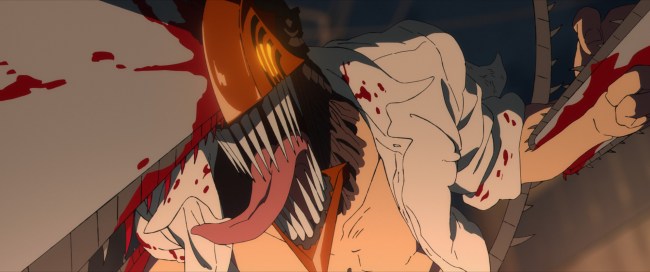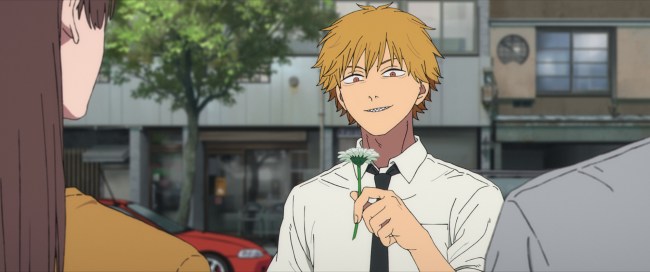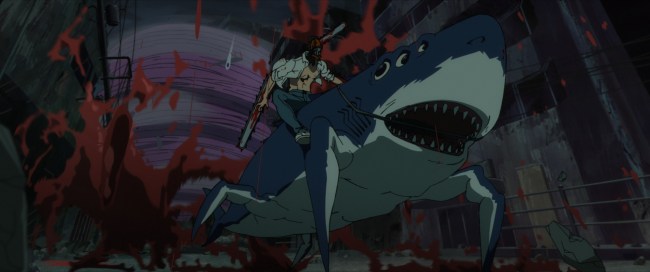Chainsaw Man The Movie Review: Anime Spinoff Rips





The opening credits sequence of “Chainsaw Man,” the fantastically bloody 2022 anime adaptation of Tatsuki Fujimoto’s popular manga, begins with a flurry of rotoscoped scenes in which main character Denji and his supporting cast are placed in famous scenes from iconic movies, ranging from “Reservoir Dogs” to “The Big Lebowski.” To a certain extent, the sequence served as something as a shout out to Fujimoto, who frequently references or cites American films like “Evil Dead” as inspiration for his crass yet emotionally resonant tale of a boy who can grow a chainsaw in his head. On another level, however, the intro was a flex designed to showcase what the team behind the series was capable of creating on their own.
Produced by studio MAPPA, who gave the production enough attention and budget that every episode had its own closing sequence, the series had a consistent polish to its animation that felt like it could actually be in movie theaters, delivering fluid, detailed fight scenes with sharp cinematic flair from week to week. Such a high-quality production sets itself up for big expectations, and expectations are inevitably sky-high now that the franchise is making the leap to cinemas by following up that first season with a sequel film.
Good news: The awkwardly titled “Chainsaw Man — The Movie: Reze Arc” more than lives up to its promise. Directed by Tatsuya Yoshihara, who helmed two episodes of the original show, the long-awaited follow-up is a gorgeously animated feast for the eyes, climaxing in a hyper-speed paced fight scene rendered on an incredible scale. But what’s most impressive about “Chainsaw Man” isn’t how beautifully drawn its big brawls and explosions are (although they’re very beautiful), it’s that it has enough trust in its characters and story to know that its quieter moments deserve just as much time and attention.

Like many anime film extensions of existing series, “Chainsaw Man: The Movie” doesn’t bother to try to catch unfamiliar audience members up to the franchise’s mythology, although much of it does take a backseat to the new characters introduced. Even so, the film doesn’t really work as a standalone: it banks a lot on the assumption that you’re already invested in Denji and his search for meaning and love for this storyline to have weight (also, it ends on a major cliffhanger). But here’s the abridged version: In a world where “Devils” are born from humanity’s collective fears and wreck havoc on the populace, the uncouth and horny Denji is a teenage orphan exploited and abused his entire life. When he merges with his only companion, the canine Chainsaw Devil Pochita, he transforms into the hybrid Chainsaw Man, and uses his powers to join the devil hunting Public Safety government organization guarding Japan. Along the way, he develops a crush on — and, to the audience, clearly gets manipulated by — the beautiful and mysterious head of Public Safety, Makima.
As the film starts, Denji is still in Makima’s thrall, but while ducking for cover during a sudden rainy spell he has a chance to meet cute with Reze, a teen barista. Flirty and adorable, Reze is obviously a much more suitable match for Denji than Makima, sharing his raunchy sense of humor and showing patience to try and educate him after learning he’s never gone to school. As Denji grapples with his growing feelings for her despite his loyalty to Makima, Reze begins prodding him to consider his place in Public Safety, and whether a teenager should really be put in the position of risking his life for the bare minimum of food and shelter.
In some respects, adapting this of all the manga’s storylines for the big screen is an odd choice. Compare it to the recent anime smash hit “Demon Slayer: Kimetsu no Yaiba Infinity Castle,” which adapts that popular manga’s climactic arc as a nonstop two-and-a-half hours of fight scenes, and “Chainsaw Man” is operating at a much slower boil. It takes about 40 minutes of the film’s 100 minute runtime for the real stakes of the story to reveal themselves, and Denji doesn’t even transform into his alter ego until a full hour into the movie.

That’s not a bad thing, though. With all the action pushed towards the end, “Chainsaw Man” can breathe and give real time and energy to the love story that’s the real heart of the film. The first half of the movie has the cadence of a teen coming-of-age romance, following Denji and Reze as they grow closer via coffee shop dates and break-ins to the local high school. Almost the entire supporting cast of the TV show are sidelined for the majority of the story, zeroing entirely on Denji and Reze’s sweet and slightly wistful dynamic. And, in the Japanese dub, the pairs’ voice actors Kikunosuke Toya and Reina Ueda do a fantastic job, emphasizing Denji and Reze’s immaturity and hesitation in this burgeoning relationship.
Their romance also looks amazing, with the animation team placing as much attention on the staging of dialogue scenes where they banter in Reze’s cafe as it does on the action bits at the end. When Denji first sees Reze’s face, the sun breaks through the clouds in a burst of light in a goofy but endearing metaphor for his instant infatuation. A scene where they strip naked and swim in a pool becomes a woozy, slow-motion dance conveying Denji’s fumbling nerves and fears. It’s an impressive use of animation as a tool for character building and drama rather than pure spectacle.
That said, “Chainsaw Man” can have its cake and eat it, too. The film’s climax is a genuinely spectacular action sequence that supercharges the already impressive fights of the original film to new heights, taking full advantage of the big screen to raise the scale significantly. The blend of 2D animation with some 3D elements and backdrops is non-intrusive and subtle, while a rock music soundtrack by Kensuke Ushio sets a breakneck pace the fight manages to match. Tons of tricks and stylistic flourishes are thrown at the audience — slow-motion sequences, color changes, a big splash image drawn to resemble one of the manga’s neon-hued covers — without ever sacrificing coherence. It’s emotionally coherent, too; for all the showiness of the animation, the climax works because of all the time the film has spent investing you in these characters, and what the conflict means for Denji.
In the opening sequence of the film, Denji goes on a “date” with Makima that mostly serves to contrast his more open dynamic with Reze, as Makima carts him to and from the local cinema for an entire day for an endless string of movies. Denji is bored out of his mind by most of them, but the last film is good enough to move him to tears. “I only find about one out of every 10 movies interesting myself,” Makima tells him. “But I’ve had that one movie change my whole life.” “Chainsaw Man — The Movie: Reze Arc” probably won’t have the same effect on most viewers, but it’s one of the best films in the recent crop of anime TV expansions, and its bittersweet teen love story is certainly potent enough to make you cry.
Grade: B+
Sony Pictures Releasing will release “Chainsaw Man — The Movie: Reze Arc” in theaters on Friday, October 24.
Want to stay up to date on IndieWire’s film reviews and critical thoughts? Subscribe now to our newly launched newsletter, In Review by David Ehrlich, in which our Chief Film Critic and Head Reviews Editor rounds up the best new reviews and streaming picks along with some exclusive musings — all only available to subscribers.
